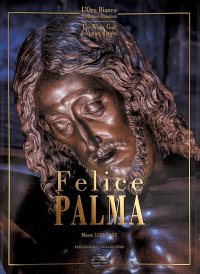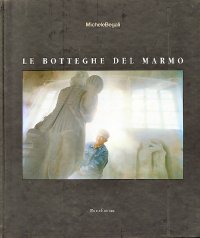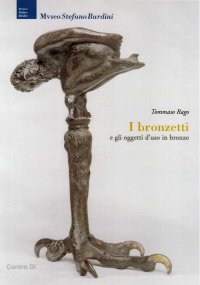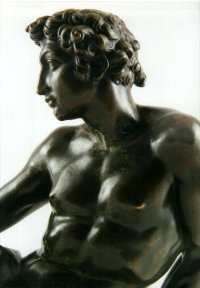Felice Palma. Massa 1583-1625. Collezione / Collection.
Testi di Andrei Cristina, Ciarlo Nicola, Federici Fabrizio, Claudio Casini e Sara Ragni.
Testo Italiano e Inglese.
Pontedera, 2024; ril. in cofanetto, pp. 289, ill. b/n e col., tavv. b/n e col., cm 24,5x34.
(L'Oro Bianco. Straordinari Dimenticati. The White Gold Forgotten Masters).
prezzo di copertina: € 160.00
|
Libri compresi nell'offerta:
Felice Palma. Massa 1583-1625. Collezione / Collection.
Testi di Andrei Cristina, Ciarlo Nicola, Federici Fabrizio, Claudio Casini e Sara Ragni.
Testo Italiano e Inglese.
Pontedera, 2024; ril. in cofanetto, pp. 289, ill. b/n e col., tavv. b/n e col., cm 24,5x34.
(L'Oro Bianco. Straordinari Dimenticati. The White Gold Forgotten Masters).
OMAGGIO (prezzo di copertina: € 160.00)
Le botteghe del marmo
Testo Italiano e Inglese.
Ospedaletto, 1992; ril., pp. 153, 10 ill. b/n, 60 ill. col., cm 24x29.
(Immagine).
OMAGGIO (prezzo di copertina: € 34.49)
Museo Stefano Bardini. I Bronzetti e gli Oggetti d'Uso in Bronzo
A cura di Nesi A.
Firenze, 2009; br., pp. 191, 102 ill. b/n, 7 ill. col., cm 17x24,5.
(Museo Stefano Bardini).
OMAGGIO (prezzo di copertina: € 30.00)
Bronzetti e Rilievi dal XV al XVIII Secolo
Bologna, 2015; 2 voll., ril. in cofanetto, pp. 729, ill., tavv. col., cm 21,5x30,5.
OMAGGIO (prezzo di copertina: € 90.00)
Flora. The Erbario Miniato and other Drawings
Garbari F. - Tongiorgi Tommaso L.
Harvey Miller Publishers
A cura di Lucia Tongiorgi Tomasi e Fabio Garbari.
Testo Inglese.
London, 2007; 2 voll., cartonato, pp. 664, ill. col., cm 22x28,5.
(The Paper Museum of Cassiano dal Pozzo. Series B: Natural History. 6).
collana: The Paper Museum of Cassiano dal Pozzo. Series B: Natural History
ISBN: 1-905375-18-2 - EAN13: 9781905375189
Soggetto: Arte Libraria (Carte, Mappe, Codici Miniati),Collezioni
Periodo: 1400-1800 (XV-XVIII) Rinascimento
Testo in: 
Peso: 3.77 kg
These illustrations were probably commissioned by Federico Cesi, Prince of Acquasparta (1585-1630), founder of Europe's first scientific academy, the Accademia dei Lincei in Rome, and were acquired after Cesi's death by Cassiano dal Pozzo. At the end of the catalogue are a number of drawings apparently commissioned by Cassiano or his brother, Carlo Antonio dal Pozzo, in later years.
Most of the drawings represent the native flora of central Italy, accompanied by notes on the traditional medicinal properties of these plants, largely taken from Pietro Andrea Mattioli's 1568 edition of Dioscorides' Materia medica. Also found within the pages of the Erbario are mycological specimens,; rarities from across Europe, and most significantly, recently imported species such as the crown imperial, the tobacco plant, the tomato and the aubergine. Together the drawings provide a fascinating insight into the study of botany at the dawn of the modern era, as traditional beliefs about the nature of plants were being subjected to a new scientific scrutiny.
Each drawing is reproduced in colour, and their botanical, medicinal and historical aspects discussed in the accompanying text. An introductory essay places the drawings in their art-historical and botanico-historical contexts, with comparative illustrations of earlier and contemporary plant illustrations.

Etica Coniugale. Per un Rinnovamento della Morale Matrimoniale
In gioco. Illusione e divertimento nell'arte italiana 1850-1950
Proarch Studium 2030. La città degli studenti/Call for projects
Officina 1922. Una Mostra alle Origini della Fortuna del Barocco











